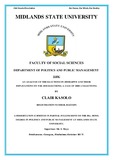Please use this identifier to cite or link to this item:
https://cris.library.msu.ac.zw//handle/11408/4077Full metadata record
| DC Field | Value | Language |
|---|---|---|
| dc.contributor.author | Kasolo, Clair | - |
| dc.date.accessioned | 2020-12-17T13:59:06Z | - |
| dc.date.available | 2020-12-17T13:59:06Z | - |
| dc.date.issued | 2017-10 | - |
| dc.identifier.uri | http://hdl.handle.net/11408/4077 | - |
| dc.description.abstract | The determination of this research was to investigate the implications of the Zimbabwe‟s elections drawing the past experience focusing mainly on the 2008 and 2013 elections. From the case study and the whole research, limited information was gathered, since the implications are still an ongoing thing in the Zimbabwean political environment. It also comes at the heart of this research to scrutinise and to gather as much information that would fill the void by the analysis of a plethora of researches and spell it out clearly. The dawn of a new Zimbabwe under the black majority that saw the emergence of ZANU-PF has noted down a malpractice of democratic norms and values within which elections would play an important role. Democracy dwells much in the rule of the people, citizen participation and equality in the political environment. In as much as democracy is concerned, the research findings tried to explore the shortcomings within which the elections in Zimbabwe has been conducted. Therefore the research managed to stresses out that the main obstacles to the running of free and fair elections were infested by violence, failure to implement the concept of separation of powers, intimidation, vote manipulation or vote rigging and also the economy. The researcher has employed qualitative and quantitative research methods, with various methods of data collection were used. Thus how the research managed to draw some of the sentiments of the same experience that would apply to the 2018 elections. In this case the research managed to draw out the same events which are likely to happen from the continued struggle laid down by the opposition and the civil society organisations that they need a regime change for economic improvement. Various demonstrations took place in 2016, explains a lot to the 2018. The outcome and the conduction of the elections is still a woe which is not yet addressed to its full capacity though some of the electoral reforms has been laid down. On the other hand, the need for electoral reform, separation of powers, and the independence of the Zimbabwe Electoral Commission (ZEC) explains a lot on the recommendations that would explain the conduction of credible elections, hence if it‟s not scrutinised, they constitute the implications to the 2018 elections. | en_US |
| dc.language.iso | en | en_US |
| dc.publisher | Midlands State University | en_US |
| dc.subject | elections in Zimbabwe | en_US |
| dc.subject | 2018 elections | en_US |
| dc.subject | implications | en_US |
| dc.subject | analysis | en_US |
| dc.title | An analysis of the elections in Zimbabwe and their implications to the 2018 elections : a case of 2008-13 elections | en_US |
| dc.type | Thesis | en_US |
| item.openairecristype | http://purl.org/coar/resource_type/c_18cf | - |
| item.grantfulltext | open | - |
| item.cerifentitytype | Publications | - |
| item.fulltext | With Fulltext | - |
| item.languageiso639-1 | en | - |
| item.openairetype | Thesis | - |
| Appears in Collections: | Bachelor Of Science In Politics And Public Management Honours Degree | |
Files in This Item:
| File | Description | Size | Format | |
|---|---|---|---|---|
| KASOLO MSU.pdf | Full Text | 816.96 kB | Adobe PDF |  View/Open |
Page view(s)
150
checked on Apr 19, 2025
Download(s)
88
checked on Apr 19, 2025
Google ScholarTM
Check
Items in MSUIR are protected by copyright, with all rights reserved, unless otherwise indicated.



